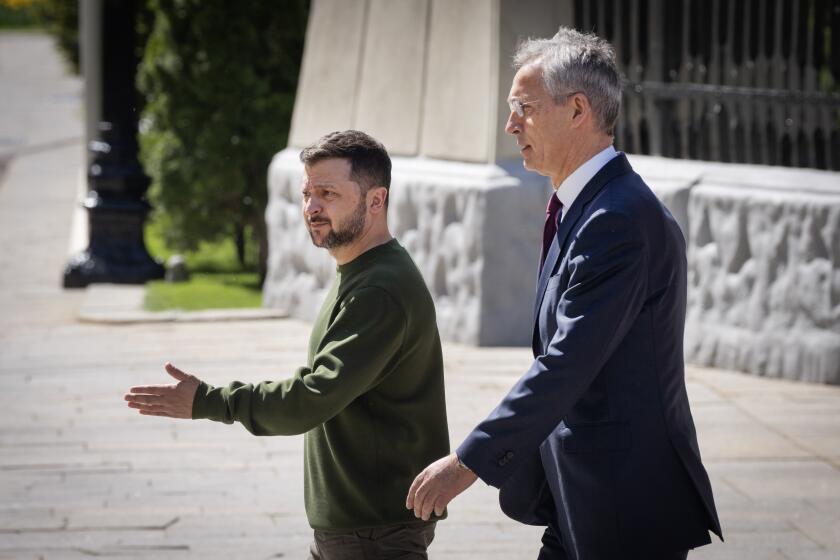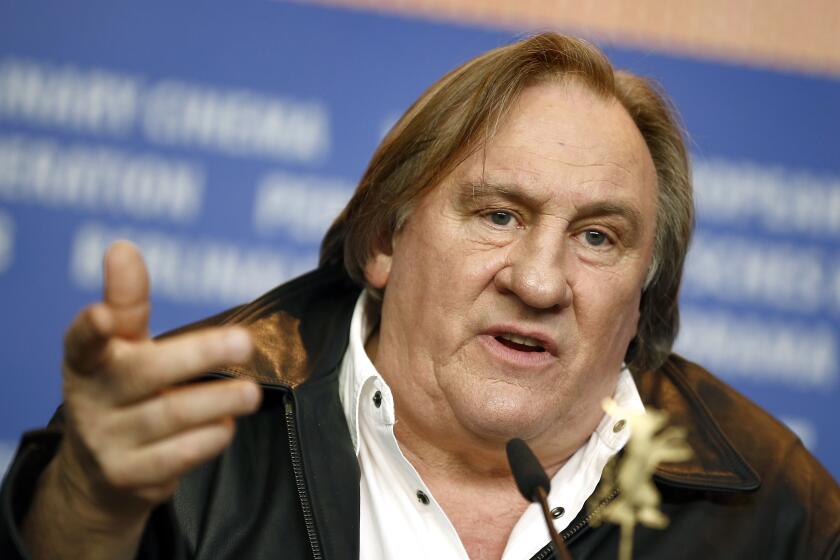U.S. Stance on PLO Limits Mideast Role, Jackson Says
In an apparent shift of positions on a highly sensitive political issue, the Rev. Jesse Jackson contended Saturday that by not meeting with the Palestine Liberation Organization the United States is limiting its ability to wield power in the Mideast, and he made plain his dissatisfaction with the law that prohibits such meetings.
Jackson’s statements during a presidential campaign debate here Saturday and in a press conference afterward came only one week after he promised that he would not meet with PLO leader Yasser Arafat, an apparent effort to ease concerns of Jewish voters during the New York primary campaign.
“It is not necessary to do that,” Jackson said last Sunday on the CBS News program “Face the Nation.” “We must not equate Arafat and the PLO with the sovereign people, the Palestinian people.”
Asked on the program if he would meet with Arafat if the PLO continues to refuse to recognize Israel, Jackson said: “I would not.”
In those comments, Jackson was merely reflecting current U.S. law prohibiting direct negotiations with the PLO, Jackson’s advisers said Saturday. The law was enacted because the PLO has long refused to recognize Israel’s right to exist.
But in the debate Saturday, in advance of Tuesday’s primary vote, Jackson defended his 1979 meeting with Arafat and implied that further meetings might be productive.
“In the case of the PLO we have opted not to talk,” Jackson said. “Since we can’t talk we can’t act, and if we can’t act, we can’t influence.
“When all is said and done,” headded, “if you can’t talk with your enemy you can’t stop your enemy from being your enemy.”
Jackson’s presidential rivals, Tennessee Sen. Albert Gore Jr. and Massachusetts Gov. Michael S. Dukakis, criticized Jackson for his previous meeting with Arafat and sharply differed with him on the potential value of any future meetings with the PLO unless it recognizes Israel’s right to exist.
Defends Prior Meeting
In defending his prior meeting with Arafat, Jackson said he had tried to persuade the PLO leader to recognize Israel. “To help secure Israel you must convince Israel’s adversaries to make a basic adjustment that the move toward mutual recognition is the thing to do,” Jackson said.
Jackson’s meeting with the PLO leader has been a major bone of contention between him and the American Jewish community and a major item of debate in the New York primary campaign because Jews make up about 25% of the Democratic primary voters here.
But Gore, who has been vigorously defending Israel in an apparent effort to gain Jewish votes, said: “I do not believe the U.S. should negotiate with the PLO.”
He called Jackson’s recent statement that he would not meet with Arafat “a step forward,” but added that he did not believe the law prohibiting U.S. officials from meeting with the PLO should be changed.
Dukakis also objected to direct negotiations, and objected to a reference Jackson made to the late Egyptian President Anwar Sadat’s meetings with Israeli leaders. “I don’t see how you can possibly equate Sadat’s attitude with the PLO’s attitude,” he said. “They are poles apart.”
Rely on Allies, Citizens
At a press conference after the debate, Jackson told reporters that given the legal restrictions on U.S. meetings with the PLO, he would rely on U.S. allies and private citizens to conduct a dialogue with the Palestinian group and to achieve “indirectly what we could not do directly.”
“We have given up the right to talk, we have given up the right to act, thus we have given up the right to change things,” Jackson said.
Sharpest Exchange
The discussion of Mideast policy was the sharpest exchange in the hourlong debate, sponsored by the League of Women Voters and aired live on Cable News Network. The three rivals spent more time attacking the Reagan Administration than each other. All of them joined in criticizing the Administration for its budget policies and for its dealings544696692Noriega. They characterized the Administration’s AIDS policies as a failure and said it was tolerating waste in defense spending.
Disclosure on AIDS
A tense moment came when CNN newsman Bernard Shaw, apparently seeking to draw out Gore on the subject of privacy of AIDS patients, asked Gore whether he would make a public disclosure if he or a member of his family contracted AIDS.
While calling for increased government efforts to combat the disease and increased public understanding of its causes and possible cures, Gore avoided directly answering the question.
Pressed repeatedly by Shaw, he finally said: “I might choose for reasons of my own not to make it public. I would confront that situation and deal with it at the time.”
Shaw also sought to put Jackson on the spot by asking him why PUSH, the Chicago-based civil rights organization founded by Jackson, had not yet settled the tax claim made against it by the Internal Revenue Service.
Standard Procedure
“Well, we’ve been in six years of debates between lawyers over allowables and disallowables, which is standard operating procedure,” Jackson said. He added that in contesting PUSH’s tax returns, the IRS had never accused the group of doing anything illegal.
“When we conclude this process, if we owe them some money they will be paid,” Jackson said. “And if they owe us some money they will pay us.”
This was the third televised debate featuring the three Democratic presidential candidates since Monday. Another debate is scheduled for today on a local television station in New York City.
Staff writer Doug Jehl contributed to this story.
More to Read
Start your day right
Sign up for Essential California for news, features and recommendations from the L.A. Times and beyond in your inbox six days a week.
You may occasionally receive promotional content from the Los Angeles Times.






